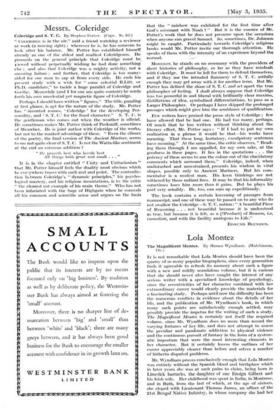Messrs. Coleridge
Coleridge and S. T. C; By Stephen-Potter. (Cape. 8s, ftdr) - COLERIDGE is in-the-air," -said a friend watching a reviewer - at work (a moving sight) ; wherever he is, he has someone to look after his balance. Mr. Potter has established himself already as one of the ablest and readiest Coleridgcans. He proceeds on the general 'principle that Coleridge must be viewed without perpetually wishing he had done something else ; and also that Coleridge was a mighty activity, not a - snoozing failure ; and further, that Coleridge is too many-- sided for one man to sap at from every side. He ends his present study with a wish for " some celestial B.Litt. or Ph.D. candidate," to tackle a huge- parallel of Coleridge and Goethe. Meanwhile (and I for one am quite content) he sends forth his own uncelestial yet magnetic figure of Coleridge.
l'erhaps I should have written " figures." The title, puzzling at first glance, is apt for the nature of the study. Mr. Potter has " invented names, ' Coleridge ' for the developing Per- sonality, and S. T. C.' for the fixed character." S. T. C. is the gentleman who comes out when the weather is official. He sometimes makes Mr. Potter think of Pecksniff, sometimes of Micawber. He is joint author with- Coleridge of the works, but not to the marked advantage of these. " Even the climax of the poetry, the final version of The Ancient Mariner, seems to me not quite clear of S. T. C. Is not the Watts-like sentiment at the end an estecean addition ?
" He prayeth best who loveth best All things both great and small . . . " . .
It is in the chapter entitled " Unity and Unitarianism "
that Mr. Potter himself feels the duality most obvious which he everywhere traces with such zest and point. The contradic- tion between Coleridge's " dynamic' principles," his psycho- logical mastery, and his religiose incantations, is to the critic the clearest cut example of his main theme." Who has not been infuriated with the Sage of Highgate when he conceals all his common and scientific sense and argues on the basis that the . " rainbow was exhibited for the first time after Cod's covenant with Noah ? " But it is the essence of Mr. Potter's work that he does not presume upon the occasions when anyone can gravel Samuel. So, sometimes, Dr. Johnson might be caught. Particularly towards Coleridge's religious books would Mr. Potter invite our thorough attention. He speaks of them with the intensity of an experience beyond the normal.
Moreover, he stands on no ceremony with the providers of short histories of philosophy, so far as they have misdealt with Coleridge. It must be left for them to defend themselves, and if they use the intruded flummery of S.. T. C. artfully enough they may get away with it for another term. But Mr. Potter has defined the share of S. T. C. and set apart the true philosopher of feeling. I shall always suppose that Coleridge was too powerful in and liberal with brilliantly clear maxims, distillations of idea, symbolized differentiations, to pass as a Larger Philosopher. Or perhaps I have skipped the prolonged passages which might give him the semblance of qualification.
Few writers have praised the prose style of Coleridge ; few have allowed that he had one. He had too many, perhaps. Of much that he has written without thinking about the literary effect, Mr. Potter says : " If I had to put my own realization in a phrase it would be that—his works have meaning. That these long, hortatory, exculpatory sentences have meaning." At the same time, the critic observes, " Read- ing them through I am appalled, for my own sake, at the goodness in these pages. It lies in the quotations . . . the potency of these seems to sun the colour out of the elucidatory comments which surround them." Coleridge, indeed, when undisturbed and unrestrained, presents his wisdom in vital shapes, possible only to Ancient Mariners. But his com- mentator is a modest man. His keen thinkings are not withered by those radiant fires. It may be that his informality sometimes loses him more than it gains. But he plays his part very sensibly. He, too, can sum up expeditiously.
.The book contains a certain leavening of passages from manuscript, and one of these may be passed on to any who do not swallow the Coleridge—S. T. C. notion: "A beautiful Piece of Reasoning . . . not beautiful because it is understood as true, but because it is felt, as a [?Product] of Reason, i.e. immediate, and with the facility analogous to Life."
EDMUND BLUNDEN.














































 Previous page
Previous page